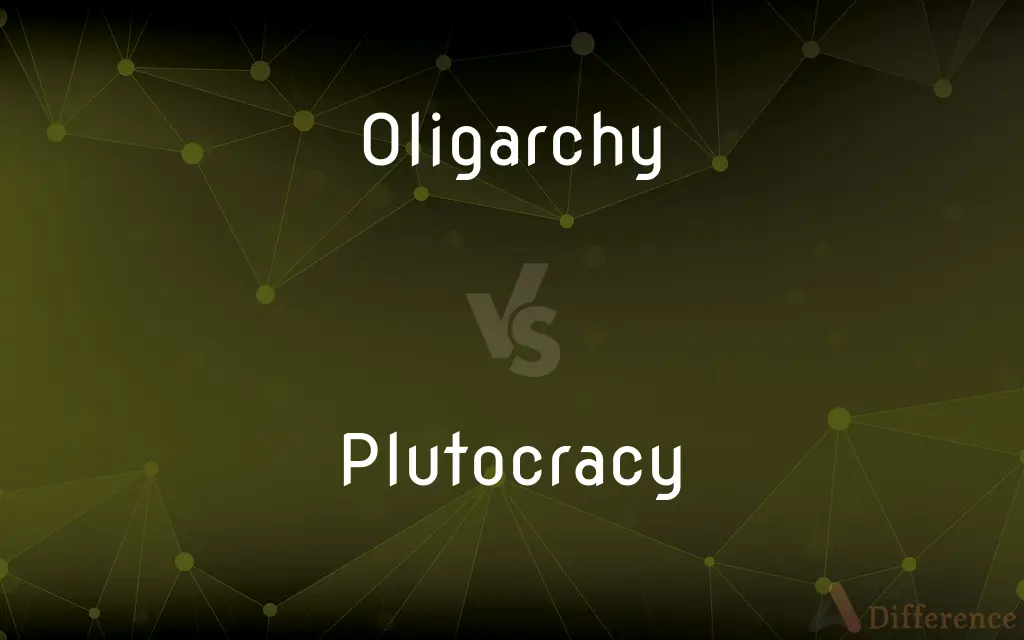Oligarchy vs. Plutocracy — What's the Difference?
By Tayyaba Rehman — Updated on April 16, 2024
"Oligarchy" refers to rule by a small group, while "Plutocracy" denotes rule by the wealthy.

Difference Between Oligarchy and Plutocracy
Table of Contents
ADVERTISEMENT
Key Differences
"Oligarchy" and "Plutocracy" are two terms that describe types of political systems. At their core, both involve a concentration of power, but the basis for this power is what distinguishes them. "Oligarchy" hails from the Greek words "oligos," meaning "few," and "archein," meaning "to rule." Contrastingly, the term "Plutocracy" derives from the Greek word "ploutos," meaning "wealth" and "kratos," meaning "power" or "rule."
Oligarchy signifies a system where power is vested in a small number of people. This group could be distinguished by factors like family ties, education, race, or military control, but not necessarily by wealth. On the other hand, Plutocracy represents a system where the wealthy, either individuals or groups, dominate the governing process. Money, in this setup, is the primary determinant of power.
Another distinction lies in the role of wealth. In an oligarchy, wealth may be a factor, but it isn't the defining one. The oligarchs could come to power through various means, like inheritance, military strength, or societal influence. Conversely, in a plutocracy, wealth isn't just influential; it's instrumental. Economic dominance translates to political power.
Summing it up, while both "oligarchy" and "plutocracy" signify concentration of power, the former indicates rule by a select few, regardless of their wealth, and the latter emphasizes governance by the economically affluent.
While a plutocracy can be an oligarchy if the ruling class is small, not every oligarchy is a plutocracy.
ADVERTISEMENT
Comparison Chart
Primary Meaning
Rule by a small group.
Rule by the wealthy.
Origin
From Greek "oligos" (few) + "archein" (to rule).
From Greek "ploutos" (wealth) + "kratos" (rule).
Determining Factor for Rule
Can be family, education, military power, etc.
Primarily wealth.
Nature of Power
Concentrated, but not solely based on wealth.
Concentrated and directly related to wealth.
Can be Overlapping?
Yes, an oligarchy can exist without vast wealth.
A plutocracy is typically a form of oligarchy.
Compare with Definitions
Oligarchy
Rule by a few, often due to heredity or influence.
The city's political structure resembled an oligarchy more than a democracy.
Plutocracy
Rule or control by the wealthy.
Critics argue that campaign financing turns democracies into plutocracies.
Oligarchy
A governance system resistant to majority influence.
Citizens protested against the oligarchy that suppressed their voices.
Plutocracy
A governance system where monetary wealth determines influence.
The rapid rise of billionaires led to fears of a plutocracy.
Oligarchy
Power vested in a select few, regardless of wealth.
Despite its vast population, only a handful controlled the oligarchy.
Plutocracy
A society where wealth dictates political power.
Many believed the city's politics had become a plutocracy due to corporate influence.
Oligarchy
A system where power is held by a small group.
Ancient Sparta was an oligarchy governed by two kings and a council.
Plutocracy
A system where economic status equates to governance power.
The wealthy elite's control over policy decisions resembled a plutocracy.
Oligarchy
Oligarchy (from Greek ὀλιγαρχία (oligarkhía); from ὀλίγος (olígos) 'few', and ἄρχω (arkho) 'to rule or to command') is a form of power structure in which power rests with a small number of people. These people may or may not be distinguished by one or several characteristics, such as nobility, fame, wealth, education, corporate, religious, political, or military control.
Plutocracy
Dominance by the economically affluent in societal decisions.
Without campaign finance reform, we risk evolving into a plutocracy.
Oligarchy
Government by a few, especially by a small faction of persons or families.
Plutocracy
A plutocracy (Greek: πλοῦτος, ploutos, 'wealth' and κράτος, kratos, 'power') or plutarchy is a society that is ruled or controlled by people of great wealth or income. The first known use of the term in English dates from 1631.
Oligarchy
Those making up such a government.
Plutocracy
Government by the wealthy.
Oligarchy
A state governed by a few persons.
Plutocracy
A wealthy class that controls a government.
Oligarchy
A government run by only a few, often the wealthy.
Plutocracy
A government or state in which the wealthy rule.
Oligarchy
Those who make up an oligarchic government.
Plutocracy
Government by the wealthy.
Oligarchy
A state ruled by such a government.
Plutocracy
A controlling class of the wealthy.
Oligarchy
A form of government in which the supreme power is placed in the hands of a few persons; also, those who form the ruling few.
All oligarchies, wherein a few men domineer, do what they list.
Plutocracy
A form of government in which the supreme power is lodged in the hands of the wealthy classes; government by the rich; also, a controlling or influential class of rich men.
Oligarchy
A political system governed by a few people
Plutocracy
A political system governed by the wealthy people
Oligarchy
Dominance by a minority in societal affairs.
The arts council operated like an oligarchy, with only a few members making decisions.
Common Curiosities
Can a democratic nation risk becoming a plutocracy?
Yes, if wealth heavily influences political decisions, democracies can exhibit plutocratic tendencies.
Is oligarchy solely based on wealth?
No, oligarchy can be based on various factors, with wealth being just one possibility.
Are oligarchies always oppressive?
Not necessarily, but oligarchies often resist majority influence which can be seen as oppressive.
Is every oligarchy also a plutocracy?
No, while every plutocracy is a form of oligarchy, the opposite isn't always true.
Does plutocracy benefit society?
Critics argue plutocracies benefit the wealthy at others' expense, but proponents might cite economic growth or stability.
Does plutocracy mean the wealthy are the only ones governing?
In a plutocracy, the wealthy have disproportionate influence, but not necessarily exclusive governance.
Is wealth the only determinant of a plutocracy?
Primarily, yes. In plutocracies, wealth directly correlates with power.
Are there modern examples of plutocracies?
Some argue that certain democracies exhibit plutocratic tendencies due to wealth's influence on politics.
Are there positive aspects to oligarchies?
Some argue oligarchies can be more efficient or stable, but it's subjective and context-dependent.
Can an oligarchy represent the majority's interests?
It's possible, but oligarchies often prioritize the ruling group's interests.
Do plutocracies always suppress the poor?
Not always, but plutocracies can lead to policies that favor the wealthy.
What causes a society to become a plutocracy?
Concentration of wealth, coupled with that wealth's influence on governance, can lead to plutocracy.
Can oligarchies exist within other political systems?
Yes, oligarchic elements can be present in democracies, monarchies, or other systems.
Can an oligarchy be temporary?
Yes, political systems evolve, and oligarchies can transition to other forms over time.
Is the term oligarchy always negative?
It's often perceived negatively, but oligarchy is neutral as a term describing power concentration.
Share Your Discovery

Previous Comparison
Parietal vs. Visceral
Next Comparison
Quantify vs. QualifyAuthor Spotlight
Written by
Tayyaba RehmanTayyaba Rehman is a distinguished writer, currently serving as a primary contributor to askdifference.com. As a researcher in semantics and etymology, Tayyaba's passion for the complexity of languages and their distinctions has found a perfect home on the platform. Tayyaba delves into the intricacies of language, distinguishing between commonly confused words and phrases, thereby providing clarity for readers worldwide.
















































